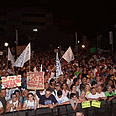
Saturday's mass protest
צילום: מוטי קמחי
Masters and servants
Op-ed: Masses at protest against haredi draft dodging were sweating, but Netanyahu sweated more
The people who filled the Tel Aviv Museum plaza Saturday night were sweating, but Prime Minister Benjamin Netanyahu, in his air-conditioned home, sweated more. He saw on the TV screen not only those who demonstrated, but the hundreds of thousands who tend to agree with them. He saw a political problem that keeps growing and becoming increasingly complex. He would have liked to resolve it in a way that satisfies everyone, but there is apparently no such solution; not now, after all the mistakes were made.
Had Netanyahu been there, he would have been highly interested in the protestors’ identity. As far as I could tell, they were older than the social protest demonstrators, and their vast majority was part of the longtime, secular population of central Israel. The reason for this is painfully simple: A generation ago, old time Israelis filled the ranks of our reserve army. The service was a constitutive experience that remained a part of their lives even years after call-up notices stopped arriving. Today, few Israelis perform reserve service and a majority hails from other sectors in society – religious-Zionists, residents of the periphery, Russians. All of these groups did not show up for Saturday night’s rally, each sector for its own reasons.
There is no great comfort for Netanyahu here, because the idea of equal service is greater than the service itself. An Israeli does not have to be called up for reserve service to feel like a sucker, and most Israelis feel like suckers. Last summer, Netanyahu responded to the protest by setting up a committee. Some of its recommendations were implemented, others were delayed, and in the meantime the summer passed and the mood changed.
This time around the story is more complex, because of the timeframe set by the High Court of Justice. On August 1st, the Tal Law will expire. This date cannot be erased from the board. A committee was formed and dismantled, and a new committee will have to face a hectic timetable without public trust. The draft dodging protest comprised only a few thousands of people until Saturday night. Itay Ben Horin, who has been a part of this struggle with Boaz Nol since its inception, told me that the record crowd at a rally before last night comprised no more than 1,500 demonstrators.
Lapid’s intervention
Netanyahu can decide not to submit a new law, but then he will outrage the haredim and pose legal troubles for the IDF. He can call new elections, but these would not be the easy elections expected two months ago – this would be a vote where his credibility is questioned. He can, of course, do what he should have done to begin with: Choose between the Plesner Committee and the haredim. Yet now the decision is tougher – the zigzags of the last few days cracked the trust in Netanyahu on both sides.Last summer’s social protest started without political affiliations. The moment it focused its criticism at Netanyahu, the Right deserted it and it turned into a Center-Left protest. In the summer of 2012 it re-emerged, this time as a radical Left protest: Much more belligerent, much less massive. The draft dodging protest is also starting as an apolitical one. As it includes a military and national aspect, it belongs to the Center-Right no less so, and possibly more so, than to the Left. I assume that what happened last summer will happen again – the heart of rightist voters will be with the protestors, but their gut will go with Netanyahu.
Many former generals arrived at last night’s protest, from Dan Halutz to Gabi Ashkenazi. Many politicians showed up – the entire Livni group within Kadima, including Livni herself; Knesset Member Moshe Matlon from Yisrael Beiteinu, a disabled IDF soldier, arrived on a wheelchair; on the other side there was Nitzan Horowitz from Meretz. Meanwhile, Shaul Mofaz proved that politics is not his natural battlefield. He arrived at the rally and was hit with boos and calls for him to quit. He could have known in advance that this would happen.
The most disturbing political intervention was that of Yair Lapid’s party. Its people took over the plaza with giant posters and handed out thousands of shirts, in an effort to carry out a hostile takeover. People on stage asked them to move their signs to the sides, yet they refused. Lapid may have benefited himself, but he only weakened the struggle for service equality.










